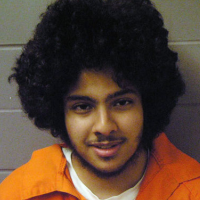For the First Time, Judge Allows Lawyer for Terror Suspect to See FISA Court Evidence
 Adel Daoud (photo: U.S. Marshals Service)
Adel Daoud (photo: U.S. Marshals Service)
A federal judge has decided for the first time that a terrorism suspect’s legal defense can review evidence gathered in secret by the government under the Foreign Intelligence Surveillance Act (pdf) (FISA).
District Court Judge Sharon Coleman in Illinois ruled this week that the attorney for Adel Daoud, who is accused of attempting to blow up a Chicago bar, can see how the Federal Bureau of Investigation collected information on him.
The ruling means that lawyer Thomas Durkin will be able to examine secret authorizations from the Foreign Intelligence Surveillance Court that allowed the FBI to spy on Daoud.
Until now, only the government and federal judges have been permitted to see a FISA application or material derived from one since Congress approved FISA in the 1978.
“While this court is mindful of the fact that no court has ever allowed the disclosure of FISA materials to the defense, in this case, the court finds that the disclosure may be necessary,” Coleman wrote.
“This finding is not made lightly, and follows a thorough and careful review of the FISA application and related materials. The court finds however that an accurate determination of the legality of the surveillance is best made in this case as part of an adversarial proceeding,” she added.
Durkin hailed the judge’s ruling, telling The Guardian: “This decision is historic, courageous and very meaningful in assuring the preservation of the integrity of the adversarial process in federal terrorism-related criminal prosecutions.”
Before representing Daoud, Durkin helped Ramzi bin al-Shibh, a Guantánamo detainee accused of helping plot the September 11, 2001, attacks. That legal work provided Durkin with a security clearance, which partly was why Coleman authorized his seeing the surveillance materials collected against Daoud.
In a related development, the U.S. Justice Department has—in the wake of Edward Snowden’s NSA revelations—begun notifying criminal defendants that FISA surveillance evidence may be used against them at trial. The first defendant to receive such notification is Jamshid Muhtorov, accused of supporting a designated terrorist organization in his native Uzbekistan.
Muhtorov’s claim that such surveillance violated the Fourth Amendment signals a potential constitutional challenge, as previous court cases have been dropped due to defendants’ inability to prove that such evidence was used against them.
Daoud’s attorneys have already stated that their review of the FISA materials will allow them to decide if they will challenge the surveillance authorization for Daoud on Fourth Amendment grounds.
Daoud, who faces additional charges of trying to solicit the murder of an FBI agent involved in his case, is scheduled to go to trial on the terrorism charges in April.
-Noel Brinkerhoff, Danny Biederman
To Learn More:
Defence Lawyers Granted Access to FISA Surveillance Documents in Terror Case (by Spencer Ackerman and Tom McCarthy, The Guardian)
Judge in Chicago Terrorism Case Lets Defense View Government Secret Surveillance Application (by Michael Tarm, Associated Press)
Defense in Loop Bomb Plot Case To Get Secret Terror Court Filings (by Jason Meisner, Chicago Tribune)
United States v. Adel Daoud (U.S. District Court, Northern Illinois)
After Bragging about Using Surveillance Law to Catch Terrorists, Government Balks at Proving it in Court (by Matt Bewig, AllGov)
- Top Stories
- Unusual News
- Where is the Money Going?
- Controversies
- U.S. and the World
- Appointments and Resignations
- Latest News
- Musk and Trump Fire Members of Congress
- Trump Calls for Violent Street Demonstrations Against Himself
- Trump Changes Name of Republican Party
- The 2024 Election By the Numbers
- Bashar al-Assad—The Fall of a Rabid AntiSemite






Comments